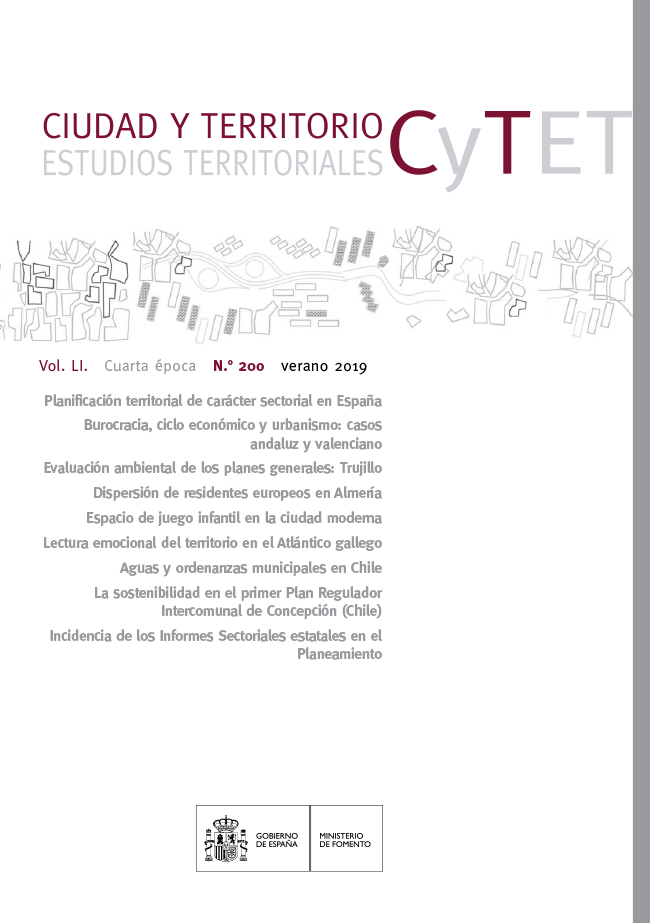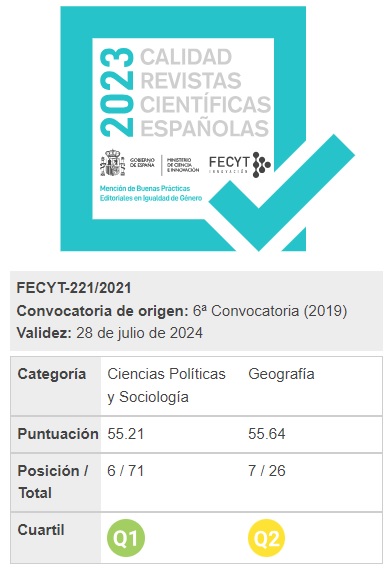Impact of National Sectorial Reports in planning
Abstract
According to Spanish legislation, certain bodies of the State Sectorial Administration have to
report on the instruments of Territorial and Urban Planning in order to coordinate national competencies
with those of the regional and local administrations. These reports, mandatory and binding, have a
considerable impact on planning, not only in its long process of elaboration and procedure, but also in
the planning proposal that they end up establishing. The present article examines the proceeding
followed in the Urban Masterplan procedure: when the reports are requested, when they should be
issued and what their object and scope is. This study allows to formulate possible answers to the core of
the problem, which is based in the need to coordinate Urban Planning, with its a global nature, with
sectorial policies which are essential to guarantee the necessary public services to structure the territory
in functional terms. These answers would involve the full incorporation of the principle of open
administration into these reports.
Downloads
Downloads
Published
How to Cite
Issue
Section
License
Copyright (c) 2019 Nuño Mardones-Fernández de Valderrama, José Luque-Valdivia, Izaskun Aseguinolaza-Braga

This work is licensed under a Creative Commons Attribution-NonCommercial-NoDerivatives 4.0 International License.
Considering the provisions of the current legislation on Intellectual Property, and in accordance with them, all authors publishing in CyTET give -in a non-exclusive way and without time limit- to the Ministry of Transport, Mobility and Urban Agenda the rights to disseminate, reproduce, communicate and distribute in any current or future format, on paper or electronic, the original or derived version of their work under a Creative Commons Attribution-NonCommercial-NoDerivative 4.0 license International (CC BY-NC-ND 4.0), as well as to include or assign to third parties the inclusion of its content in national and international indexes, repositories and databases, with reference and recognition in any case of its authorship.
In addition, when sending the work, the author(s) declares that it is an original work in which the sources that have been used are recognized, committing to respect the scientific evidence, to no longer modify the original data and to verify or refute its hypothesis. Author(s) also declare that the essential content of the work has not been previously published nor will it be published in any other publication while it is under evaluation by CyTET; and that it has not been simultaneously sent to another journal.
Authors must sign a Transfer of Rights Form, which will be sent to them from the CyTET Secretariat once the article is accepted for publication.
With the aim of promoting the dissemination of knowledge, CyTET joins the Open Journal Access (OA) movement and delivers all of its content to various national and international indexes, repositories and databases under this protocol; therefore, the submission of a work to be published in the journal presupposes the explicit acceptance by the author of this distribution method.
Authors are encouraged to reproduce and host their work published in CyTET in institutional repositories, web pages, etc. with the intention of contributing to the improvement of the transfer of knowledge and the citation of said works.








 Enlace a CyTET en Linkedin
Enlace a CyTET en Linkedin